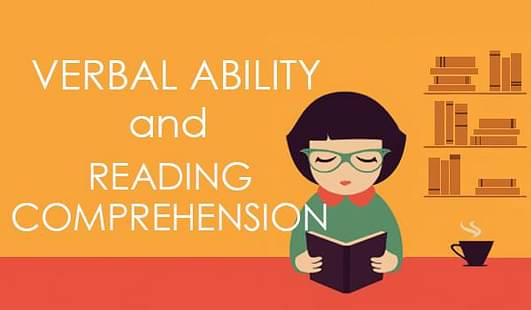
At the time of CAT 2015, Verbal Ability and Reading Comprehension (VARC) was the first section that students needed to tackle and had 34 questions. Given the background of the most of the students in top 20 percentile, Quant, LR and DI sections were not that troublesome as Verbal Ability and Reading Comprehension (VARC) section.
VARC had 34 questions, out of which a staggering 24 were MCQs from Reading comprehension (RC)−its share was 70% in the section. There were 24 questions on 5 RC passages which were majorly factual, not very lengthy or abstract. However, passages were quite tricky or tough depending on your point of view.
Keeping in with the trend of past few years, RC passages in CAT 2015 were relatively shorter - about 500 words to 800 words. What made the task of a student difficult was that passages were rich on vocabulary and questions were replete with Verbal Logic which needed prior practice. But fortunately, there were no direct vocabulary questions in CAT 2015.
The types of questions varied such as ‘the message conveyed by the author through a particular sentence or the entire RC passage’, 'the purpose of writing the passage’, ‘what can be inferred’ etc. ‘Tone of the passage’ type questions were not there but some theme based questions were there. Surprisingly,there were no questions of vocabulary or grammar type questions.
This indicates that CAT is showing a change in its preference in checking the managerial aptitudes. If we analyze the last five years CAT Exams, there will be no doubt that RC is the decider in this section. And remember that most of Indian Institute of Management's (IIM) and good B-schools have sectional cut-offs.
Preparing well in this section is a must
Preparing Reading Comprehension and attempting RC questions are probably the most painful part of the entrance exam. The frequently turgid and turbid texts of the passage make subject matter esoteric and the questions recondite. The situation becomes unmanageable when answer choices appear to be indistinguishable. Alas, there is hardly a way to avoid Reading Comprehension. Even for CAT 2016, expect at least half of the VA section to be RC questions. So it is must to have a positive attitude and a clear strategy to extract maximum in a minimum period of time. Five tips are discussed here that would guide you to get maximum mileage in the Reading Comprehension section:
Reading Comprehension passages are often dull and uninteresting −Don’t expect a stimulating read
The Reading Comprehension are often dull, written as if to showcase the vocabulary and caricature with the language. It often deals with subjects of which you are neither interested nor knowledgeable. Since you are likely to know very little about the subject, you will have difficulty in understanding. But why worry about that? Everybody is in the same boat as you are. Why worry if you have not read earlier about 'God’s particle' or 'superconductors' or 'the life cycle of amphibians' or 'how the medieval poetry evolved' so on or so forth. The test doesn’t expect you to know any of these abstruse subjects. It intends to test your ability to read quickly, to extract and process information efficiently. They want you to draw inferences and make logical connections between two given arguments in the passage even though you have no previous knowledge or exposure on the material. However, it makes sense if you widen your areas of casual reading. Do remember that there will be passages that involves issues around various topics. Feeling at home is possible if you have the habit of reading essays on various topics. Learning to focus is key - practice reading esoteric texts that would help you understand logic of the abstract subject.
Anticipate the types of questions you will be asked
Answer to why you are reading a passage is the key. If you read for enlightenment, intellectual stimulation or entertainment, you need to devote a lot of time understanding a passage. But when you read for one and only one purpose, which is to answer questions based on the passage, you will concentrate on the reading bit only. You need not try to understand everything the author says nor do you need to memorize every line or word of the passage. All you need to do is to glean through the passage and extract enough to answer the questions at hand. You need to understand the main argument of the passage and remember where to find the evidence to find the correct answer. Read the passage quickly with a probing eye and in anticipation of getting the important clue to answer the questions surrounding the main idea, the inference questions and the supplementary idea questions.
Types of questions
- Knowing the types of questions help. All types of questions can be handled if you can grasp three basic things. First, the Main Idea of the passage. If you grasp the Main idea then questions such as: ‘What is the author’s central point’, ‘Why has the author written this text’, ‘What is the author’s main purpose in writing the passage’, ‘What has the author chosen to convey in the passage’, ‘How has the author chosen to convey his argument‘, ‘How has the author organized the passage?’ can be answered easily.
- Second, if you grasp the Supplementary Idea then questions that focus on the details of the argument or on the evidence that the author has presented to support his contentions can be answered easily. These types of questions may start with “According to the author/the passage…”
- Third, you have to make inference from the argument that author has presented in the passage. You have to draw inference on what the author has suggested but not necessarily stated clearly. Such questions focus on what is implicit in the text,. Such questions are like ‘What is the author’s approach to X’ ‘What do you infer from…’, ‘Which of the following can be inferred from the passage’, ‘Which of the following can be inferred from the XXX paragraph’., Why does the author mention Y? How might the author respond to argument Z?
Extract Information Actively
Learn to read strategically and aggressively. You cannot passively absorb information− you need to extract information actively, do not get too much into details. Instead focus on the main points, else you will lose time. Just read the passage thoroughly; you may go for a second reading to pick up whatever you missed when you start answering the questions. Be strategic: read the first and the last paragraph well. These two paragraphs help you understand the Main Idea questions.
Avoid Regression
If understanding the passage is a big challenge in Reading Comprehension, the challenge of time saving or not losing time is even bigger. In order to follow the author and his argument, to understand how he has arrived at his conclusions, to grasp flow of the passage with detail and to comprehend how one argument develops into another, you tend to lose a significant time. Ideally a passage with four or five questions has to be attempted in 8, at most 10 minutes (including reading time). 2015 CAT had five passages and 24 questions. A total of 34 questions were to be attempted in 60 minutes. Therefore, it is a waste of time reading the same sentences carefully twice or even three times over. You should read to know where the crucial information is located in the passage.
Answer choices to avoid
Like in Critical Reasoning, the incorrect answer choices in Reading Comprehension can also be identified and hence dismissed easily. You should be on a look out for answer choices that can be ruled out right away as incorrect. Hence, avoid answer choices,
- That use words such as “only,” “all,” “always,” “never” and “exclusively” which makes the statement categorical
- That is out of the scope of the passage i.e., which has information that doesn’t appear in the text
In which the fact mentioned is correct but not relevant to the question asked
- That sound contentious or includes statements which is extremely critical to the extent of bad mouthing
- That ask you to make value judgments and include statements that say one method/ approach/ style of management/ school of thought is “better,” or “more efficient” than another
- That include statements which is extremely eulogizing to the extent of calling it the best or superior most.
As a CAT taker you are lucky in a sense that unlike GMAT or GRE, you don’t have to attempt all questions. Remember, in CAT your relative position (percentile) is important, not the marks. Hence, you should learn the ‘art of leaving’ also. To maximize attempt and score, you must apply your judgment to be selective?

















Similar Articles
Christ University BBA Admissions 2024: Registration (Started), Exam Dates (Out), Pattern, Syllabus, Admit Card
XAT Score vs Percentile 2024: Official Cut off, Score Predictor
Top MBA Entrance Exams 2024 in India: Dates, Registration, Top Colleges
MBA Admission 2024 (Open): Application Dates, Entrance Exams, Admission Process & Top Colleges
List of Top 10 MBA Specialisations in 2024: Choose the Best One
CMAT Important Topics 2024 - Section-wise Weightage